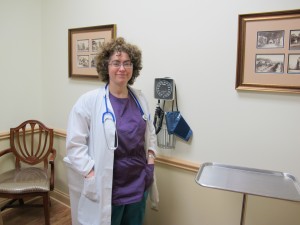Supreme Court sends Act 13 "doctor gag rule" challenge back to lower court
-
Katie Colaneri

Susan Phillips / StateImpact Pennsylvania
Dr. Amy Pare says she has treated workers and residents who think gas drilling has made them sick.
This week, the Pennsylvania Supreme Court ruled on some controversial provisions of Act 13, the 2012 overhaul of the state’s natural gas drilling laws.
The justices also weighed in on one provision of the law that makes some medical professionals nervous. They call it the “doctor gag rule.”
Act 13 allows physicians to see a full list of the chemicals used in natural gas drilling, including those that are deemed a trade secret, in order to treat patients who may have been exposed. But some doctors say language in the law prohibits them from sharing that information with their patients and with other doctors. You can read our annotated version of Act 13, including the “doctor gag rule” here.
Attorneys for Dr. Mehernosh Khan, a primary care physician who worked for more than 30 years in the Pittsburgh suburbs, doesn’t think the law adequately protects doctors.
“I need to be sharing that information with other physicians who might be able to help me in taking care of the patient and not feel like I could be sued or threatened, so I feel that this is definitely a step in the right direction,” said Dr. Khan, who moved to Massachusetts one year ago.
The Commonwealth Court ruled last summer that Khan did not have grounds to challenge the law because he had not requested information about chemicals used in natural gas drilling or been blocked from providing proper medical care to his patients.
In the majority opinion, the Supreme Court ruled Khan has standing to challenge the law and sent the case back to the lower court. You can read our annotated version of the ruling here.
“I feel that this is definitely a step in the right direction,” said Khan.
The Corbett administration has expressed disappointment in the ruling. In the past, the Department of Health has tried to assure doctors that they are protected under the law.
“The petitioners who have made the assertion that this law precludes sharing of information with either the patient or other physicians are absolutely wrong,” Corbett’s Energy Executive Patrick Henderson told StateImpact Pennsylvania in an e-mail. “Moreover, they continue to harm the importance of this provision in protecting public health by furthering such false claims.”
Henderson said this provision was based on a similar law in Colorado and was brought to the state’s attention by two environmental groups, the Pennsylvania Environmental Council and the Environmental Defense Fund.
“It’s worth noting that, nearly 19 months after enactment, we are unaware of any actual problems that have been encountered,” Henderson wrote.
But Dr. Amy Pare, President of the Allegheny County Medical Society, says she has seen patients who may have been exposed to proprietary chemicals in gas drilling, but because she fears the law would not protect her, she does not share that information with her patients. That makes them nervous.
“They can’t Google it, they can’t search it because they don’t know what they’re looking for,” Dr. Pare said. “They freak out.”
















